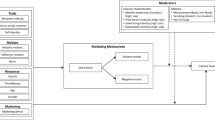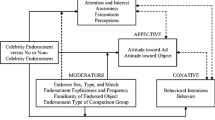Abstract
By integrating research from attitude challenge matching and consumer alignment and judgment revision, the authors explore how firms can position brands to insulate them from negative publicity and how consumers evaluate brands in reaction to such publicity. They introduce an important moderator of brand evaluation revision, prior brand attitude certainty, and propose that when negative publicity matches or “aligns” with the basis of a brand attitude, certainty in that attitude interacts with the attitude, determining the affect of the negative publicity on brand evaluations. The results of two experiments suggest that prior brand attitudes held with high certainty tend to “nsulate” brands, even when negative publicity matches or aligns with the bases of brand attitudes, whereas brand attitudes held with low certainty may exacerbate the effects of negative event publicity. The results also show that multiplex positioning (positioning a brand with both performance-and values-based attributes) may insulate brands more effectively from negative publicity.
Similar content being viewed by others
References
Aaker, Jennifer, Susan Fournier, and S. Adam Brasel. 2004. “When Good Brands Do Bad.”Journal of Consumer Research 31 (June): 1–16.
Abelson, Robert P. 1988. “Conviction.”American Psychologist 43 (April): 267–275.
Ahluwalia, Rohini. 2002. “How Prevalent Is the Negativity Effect in Consumer Environments?”Journal of Consumer Research 29 (September): 270–280.
—, Robert E. Burnkrant, and H. Rao Unnava. 2001. “Consumer Response to Negative Publicity: The Moderating Role of Commitment.”Journal of Marketing Research 38 (May): 203–214.
—, H. Rao Unnava, and Robert E. Burnkrant. 2001. “The Moderating Role of Commitment on the Spillover Effect of Marketing Communications.”Journal of Marketing Research 38 (November): 458–471.
Ajzen, I. and M. Fishbein. 1980.Understanding Attitudes and Predicting Social Behavior. Englewood Cliffs, NJ: Prentice Hall.
Anderson, Norman H. 1981.Foundations of Information Integration Theory. New York: Academic Press.
Berens, Guido, Cees B. M. van Riel, and Gerrit H. van Bruggen. 2005. “Corporate Associations and Consumer Product Responses: The Moderating Role of Corporate Brand Dominance.”Journal of Marketing 69 (July): 35–48.
Brown, Tom J. and Peter A. Dacin. 1997. “The Company and the Product: Corporate Associations and Consumer Product Responses.”Journal of Marketing 61 (January): 68–84.
Dawar, Niraj and Madan M. Pillutla. 2000. “Impact of Product-Harm Crises on Brand Equity: The Moderating Role of Consumer Expectations.”Journal of Marketing Research 38 (May): 215–226.
Eagly, Alice H. and Shelly Chaiken 1995. “Attitude Strength, Attitude Structure, and Resistance to Change.” InAttitude Strength: Antecedents and Consequences, Vol. 4. Eds. Richard E. Petty and Jon A. Krosnick. Mahwah, NJ: Lawrence Erlbaum, 413–432.
Edwards, Kari. 1990. “The Interplay of Affect and Cognition in Attitude Formations and Change.”Journal of Personality and Social Psychology 59 (August): 202–216.
Fabrigar, Leandre R. and Richard E. Petty. 1999. “The Role of Affective and Cognitive Bases of Attitudes in Susceptibility to Affectively and Cognitively Based Persuasion.”Personality and Social Psychology Bulletin 25 (March): 363–381.
Festinger, Leon. 1954. “A Theory of Social Comparison Processes.”Human Relations 7 (July): 117–140.
Greyser, Stephen A. 1995. “Corporate Reputation: Aid to Growth and Shield.”Reputation Management January–February:73–74.
Gross, Sharon R., Rolf Holtz, and Norman Miller. 1995. “Attitude Certainty.” InAttitude Strength: Antecedents and Consequences. Eds. Richard E. Petty and Jon A. Krosnick. Mahwah, NJ: Lawrence Erlbaum, 215–245.
Haugtvedt, Curtis P., Clark Leavitt, and Wendy L. Schneier. 1993. “Cognitive Strength of Established Brands: Memory, Attitudinal, and Structural Approaches.” InBrand Equity and Advertising. Eds. David A. Aaker and Alexander L. Biel. Hillsdale, NJ: Lawrence Erlbaum, 247–261.
Keller, Kevin Lane. 1993. “Conceptualizing, Measuring, and Managing Customer-Based Brand Equity.”Journal of Marketing 57 (January): 1–22.
—. 2003.Strategic Brand Management: Building, Measuring, and Managing Brand Equity (2nd ed.). Upper Saddle River, NJ: Prentice Hall.
— and David Aaker. 1997. “Managing a Corporate Brand: The Effects of Corporate Images and Corporate Brand Extensions.” MSI Working Paper Series. Cambridge, MA: Marketing Science Institute.
Mahajan, Vijay, Eitan Muller, and Roger A. Kerin. 1984. “Introduction Strategy for New Products with Positive and Negative Word-of-Mouth.”Management Science 30 (December): 1389–1404.
Marcus, Alfred A. and Robert S. Goodman. 1991. “Victims and Shareholders: The Dilemmas of Presenting Corporate Policy During a Crisis.”Academy of Management Journal 34 (June): 281–305.
Millar, Murray G. and Karen U. Millar. 1990. “Attitude Change as a Function of Attitude Type and Argument Type.”Journal of Personality and Social Psychology 59 (August): 217–228.
Muthukrishnan, A. V., Michel T. Pham, and Amitabh Mungale. 1999. “Comparison, Opportunity, and Judgment Revision.”Organizational Beliavior and Human Decisions Processes 80 (December): 228–251.
Park, C. Whan, Bernard J. Jaworski, and Deborah J. Mclnnis. 1986. “Strategic Brand Concept-Image Management.”Journal of Marketing 50 (October): 135–145.
Petty, Richard E. and Duane T. Wegener. 1998. “Matching Versus Mismatching Attitude Functions: Implications for Scrutiny of Persuasive Messages.”Personality and Social Psychology Bulletin 24 (March): 227–240.
Pham, Michel Tuan and A. V. Muthukrishnan. 2002. “Search and Alignment in Judgment Revision: Implications for Brand Positioning.”Journal of Marketing Research 39 (February): 18–30.
Pomerantz, Eva M., Shelly Chaiken, and Rosalind S. Tordesillas. 1995. “Attitude Strength and Resistance Process.”Journal of Personality and Social Psychology 69 (September): 408–419.
Shimp, Terry, Eva Hyatt, and David Snyder. 1991. “A Critical Appraisal of Demand Artifacts in Consumer Research.”Journal of Consumer Research 18 (December): 273–283.
Shrivastava, Paul and Ian I. Mitroff. 1987. “Strategic Management of Corporate Crises.”Columbia Journal of World Business 22 (Spring): 5–12.
Volkmann, J. 1934. “The Relation of the Time of Judgment to the Certainty of Judgment”Psychological Bulletin 31:672–673.
Wood, Wendy, Nancy Rhodes, and Michael Biek. 1995. “Working Knowledge and Attitude Strength: An Information-Processing Analysis.” InAttitude Strength: Antecedents and Consequences. Eds. Richard E. Petty and Jon A. Krosnick. Mahwah, NJ: Lawrence Erlbaum, 283–313.
Author information
Authors and Affiliations
Additional information
Chris Pullig (chris_pullig@baylor.edu) is an assistant professor of marketing in the Hankamer School of Business at Baylor University. Before beginning his academic career, Professor Pullig worked in the retail industry as the CEO of a chain of specialty clothing stores and also as a consultant with the Small Business Administration. He received his Ph.D. from Louisiana State University and was previously on the faculty at the University of Virginia. His research is in consumer attitudes and decision making, with an emphasis on effective creation and the protection of consumer-based brand equity. His previous work has been published in theJournal of Marketing, theJournal of the Academy of Marketing Science, theJournal of Retailing, theJournal of Consumer Psychology, theJournal of Public Policy and Marketing, and others.
Richard G. Netemeyer (rgn3p@virginia.edu) is the Ralph A. Beeton Professor of Free Enterprise in the Mclntire School of Commerce at the University of Virginia. He received his PhD in business administration from the University of South Carolina in 1986. From 1986 to 2001, he was a member of the Marketing Department in the College of Business at Louisiana State University. In 2001, he joined the faculty at Mclntire. His substantive research interests include’ consumer and organizational behavior topics and public policy and social issues. His methodological research interests focus on survey methods and measurement. His research has been published in theJournal of Marketing, theJournal of Marketing Research, theJournal of Consumer Research, theJournal of Applied Psychology, theAmerican Journal of Public Health, and others.
Abhijit Biswas (a.biswas@wayne.edu) is the Kmart Endowed Chair and Professor of Marketing at the School of Business Administration, Wayne State University. He received his PhD from the University of Houston. His research interest is primarily in the area of pricing and consumer behavior, and he has published numerous research papers in journals such as theJournal of Marketing, theJournal of the Academy of Marketing Science, theJournal of Retailing, theJournal of Consumer Psychology, theJournal of Public Policy and Marketing, theJournal of Advertising, theJournal of Business Research, Psychology and Marketing, Marketing Letters, and other refereed journals and proceedings. He currently serves on the editorial boards of theJournal of the Academy of Marketing Science and theJournal of Public Policy and Marketing and is the associate editor for the Business and Marketing Research track of the Journal of Business Research.
Rights and permissions
About this article
Cite this article
Pullig, C., Netemeyer, R.G. & Biswas, A. Attitude basis, certainty, and challenge alignment: A case of negative brand publicity. JAMS 34, 528–542 (2006). https://doi.org/10.1177/0092070306287128
Issue Date:
DOI: https://doi.org/10.1177/0092070306287128




